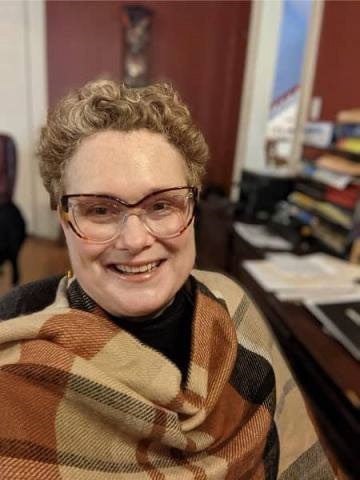
Online Certificate in Infant & Early Childhood Mental Health Consultation
Learn the specialized role of consulting in early childhood settings from experts in the field.
The Online Certificate in Infant & Early Childhood Mental Health Consultation (IECMHC) provides advanced training for mental health clinicians in the specialized role of IECMHC in early childhood settings. You’ll learn approaches to promote mental health in the early childhood years and how the role of IECMH consultant is unique from other mental health clinician roles, as well as how consultation aims to build the capacity of early childhood professionals, settings, and systems to support young children’s mental health.
You’ll engage with national experts in the field of IECMHC and instructors from Thrive Center for Children, Families and Communities at Georgetown University, home of the Center of Excellence in Infant and Early Childhood Mental Health Consultation. All faculty have created, implemented, evaluated or and guided national IECMHC programs. You’ll leave the program equipped with the knowledge needed to effectively support well-being for young children, families, and professionals in early childhood settings in the consultant role. You will also develop a network in the field to promote and support your professional development.
Program at a Glance
- Ideal For: early childhood mental health consultants or licensed mental health clinicians considering a specialty in IECMHC
- Duration: 9 months
- Tuition: $6,000
- Format: Online
- Schedule: Live one Friday per month & asynchronous online, 11:00-1:00 PM EST
- Semester of Entry: Fall
Learning Outcomes
Upon successful completion of the certificate, you will be able to:
- Identify infant and early childhood mental health consultation theoretical foundations and theory of change, and how those differ from dyadic or group-based mental health treatment; describe the history of infant and early childhood mental health consultation and why it is needed.
- Describe the current evidence base for infant and early childhood mental health consultation, childhood developmental milestones, and developmentally appropriate behavior.
- Recognize areas of consultation focus at the child, classroom, and programmatic levels.
- Recognize how to document consultation work so it can be quantified and develop a plan for sharing it with others, how assessment is integrated into and supported by consultation work, and develop an assessment plan.
- Describe how culture (beliefs, values, attitudes, biases, and experiences), equity, and environment shape relationships and behaviors, and how they influence settings and communities in important and meaningful ways.
- Identify the role of supervision in infant and early childhood mental health consultation beyond what is required for clinical licensure and describe approaches to supervision utilized in infant and early childhood mental health consultation.
“The Thrive Center at Georgetown University, formerly the Center for Child and Human Development, has been the national leader in infant and early childhood mental health consultation for decades, and participants benefit from the faculty’s extensive experience in delivering and evaluating consultation services. Completion of this certificate recognizes a student’s specialized training in both promoting mental health for young children as well as the unique role consultation plays in building the capacity of early childhood settings.”
Neal Horen, Ph.D., Certificate in Infant & Early Childhood Mental Health Consultation
Curriculum & Schedule
During the Fall 2025 semester, professional development and certificate classes will consist of a Live Online class and asynchronous online assignments. Live classes are taught in real-time by Georgetown instructors using Zoom video conferencing. Asynchronous online assignments are completed through Canvas, our learning management system, and can be completed at your own pace. Certificate programs are designed to provide our professional learners with a high-quality, engaging educational experience.
For more information, please contact Program Support: IECMH-Certificates@georgetown.edu .
The Certificate in Infant & Early Childhood Mental Health Consultation is offered in a Flex Learning environment using live Zoom video conferencing to mirror a more traditional classroom with regular interaction, engaging activities, and the dynamic exploration of topics and concepts.
Syllabus
What Is Live Online Learning?
Live online instruction is enhanced by incorporating various instructional practices and technology tools. Features such as Zoom video conferencing, breakout rooms, and chat allow for real-time interaction and collaboration among learners. Tools like Google Docs, Slides, Sheets, and Canvas Groups facilitate teamwork and information sharing within the learning community. Polling, surveys, and threaded discussion boards promote active engagement and the expression of opinions. It is important to foster social respect, privacy, and incorporate Jesuit values to create a supportive and inclusive online environment. By utilizing these practices and tools effectively, live online instruction can be engaging, interactive, and conducive to meaningful learning experiences.
Directors
Research Instructor
Associate Professor of Pediatrics
Director of Infant, Early Childhood and Relational Health, Thrive Center for Children, Families, and Communities
Adjunct Lecturer – SCS CCPE | Evaluator
Project Director
Guest Faculty
The Certificate in Infant & Early Childhood Mental Health Consultation is a selective program with a competitive admissions process. For each cohort, an application review committee offers admission to a select and diverse group of students to enrich the classroom experience. A completed application will include the following documents:
- Completed application form
- Resume/CV
- Statement of Purpose
Application Dates
- Application opens May 23, 2025
- Deadline for application: September 1, 2025
Program Prerequisites
Education
- A minimum of a master’s degree in a mental health field (e.g., psychology, counseling, social work) OR
- Enrolled in a mental health field graduate program
- Mental health licensed or license-eligible (e.g., enrolled in a graduate program with prior clinical experience)
- Please reach out if you do not meet these requirements, and we can discuss fit. We strive to be flexible while delivering an exceptional student experience.
Experience
- At least two years of supervised clinical experience (during mental health graduate training or post-graduate)
- Currently working in mental health or a related field.
International Students
A TOEFL examination is not required for non-native speakers of English. Still, students are expected to read, write, and comprehend English at the graduate level to fully participate in and gain from the program.
Students from most countries may register for our online certificate programs, however, due to international laws, residents of certain countries are prohibited from registering.
Tuition & Funding
The Certificate in Infant & Early Childhood Mental Health Consultation has a limited number of tuition scholarship that may be available, please indicate on your application if you are interested in a scholarship.
Noncredit professional certificates do not qualify for federal financial aid, scholarships, grants, or needs-based aid. However, several finance and funding options do exist, as listed below.
Contact Us
For questions about the program, please contact: IECMH-Certificates@georgetown.edu .





